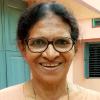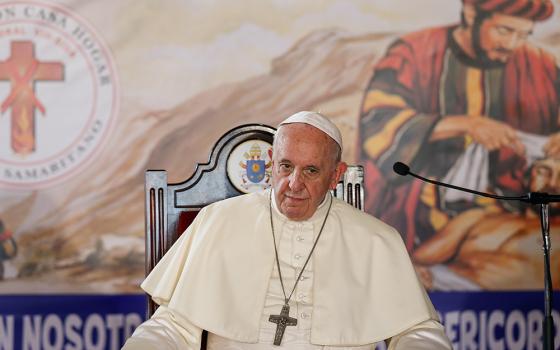
Girls who live at Asha Bhavan hostel in the Berhampur Diocese in Southern Odisha, India, join an event for Children's Day, which is celebrated annually in India on Nov. 14. (Courtesy of Shanti Pulickal)
It is said that a successful life is the outcome of 10 percent luck and 90 percent how one responds to the challenges of life. The responses may vary from person to person, and so does the rate of success. Some face the realities of life with faith and self-confidence, while others sink under it.
We face this reality at Asha Bhavan (house of hope), our hostel for girls with disabilities at Berhampur, in the southern part of Odisha state in eastern India. Almost all have experienced the poliovirus that has affected not only their limbs but also their brains, though in varying degrees. Corrective surgery reduces mobility problems to some extent. But many lack the power of concentration and comprehension.
We feel frustrated at seeing them satisfied with the minimum education, despite all our efforts to prepare them for higher studies. Yet there are some who, by their patience and perseverance, have stood against all odds and have found their way to mainstream life. Vidya Nayak stands out as an outstanding example in our hostel.
Overcoming rejection through faith and constant prayer is the first lesson she learned from her parents. She wrote in her personal diary:
I am the eldest in my family. Years ago, some of my neighbors who had a grudge against my father kept repeating to my mother, "You will never be blessed with a baby." But my mother kept praying and I was born after three years. But within a week I was affected by polio. The neighbors were happy and exclaimed, "This child will never walk."
But her parents did not give up and prayed with greater confidence in God. Their faith was rewarded, and Vidya started walking within a year.
As the years went by, siblings were born and they roamed the streets as children do in villages. But Vidya confined herself to their small house and was content to play with the little toys her parents provided. "What shall I do with her?" cried her mother, for the child was afraid and reluctant to step outside. A feeling of inferiority was deep within her.
When they heard of our hostel for girls with disabilities, they were relieved and brought her to us at age 5. When she saw other children, limping and even crawling, she felt at home; slowly her inner fears vanished and she blossomed into a person of courage, confidence and determination. It was her good luck that an agency offered to sponsor a few children in an expensive English medium school. Vidya was one of them. The curriculum was hard in the higher classes, and only two girls completed high school there. We had to find other means for the rest, as the school refused to keep them.
Since Vidya was ambitious and hard-working, we got her admitted into a college, and she finished a bachelor's degree in business administration in April. She is already employed at a good company. The salary is not very attractive but she feels at home, as it satisfies her inner aspirations.
What I admire most in Vidya is the way she has accepted her weaknesses and made them her strength. It is here that she becomes a model for others. Her right leg is shorter than the left by 4 inches, so the heels of her shoes are designed accordingly. Once she heard a group of young boys remarking sarcastically, "What a fashionable girl; look at her shoes." Vidya replied in the same tone: "Hey boys, I am a disabled girl and my shoes are designed by the doctor." The boys put their heads down in shame and apologized!
In our hostel she excelled not only in studies, but in every form of activity, including cultural programs, conducting prayer services and giving spontaneous speeches — even in public. The sisters often would say, "It's a joy to go to her school for the parent-teachers meeting."
Advertisement
The teachers spoke well about her. Their only complaint was that she was an introvert and did not mingle freely with other students. But, let anyone insult her, and they would see her true color — and they would never dare do it again! She won their respect and not their sympathy.
In the hostel she was free and relaxed and would even argue with other girls to get her points across. The small children clung to her, as she supported them and helped them in their studies and other personal needs. She held us — the convent sisters and other higher authorities — in high respect and was humble and submissive.
In the lower school she was an average student, but in college she ranked fourth, and the principal recommended her for a good job. However, what he considered "good" was not the one she wanted. She searched until she found the job that suited her inner aspirations. We were also happy about her choice and admired her sense of discernment.
Once I asked Vidya, to tell me the secret of her success in life. "Sister, read this," she said, and showed me her diary.
Ever since my birth, often I would go into a state of depression [about] my inevitable degradation. Then my tears would roll down until the day when I read a passage from Ephesians 1: 11: "All things are done according to God's plan and purpose and God chose us to be his own people." Then my heart was pleased thinking, it is a blissful and purposeful life, gifted to fulfill God's will and purpose.
Steve Jobs, the founder of Apple, elevated her spirit when she read his 2005 words addressed to the students at Stanford University: "The only way to do great work is to love what you do." With a broad smile, she said, "These words had marvelous impact on me and captured the essence of my evolution."
As she left the hostel to take up the job, we were proud of her but were sad to miss her. With tears in her eyes she said, "I will keep visiting the hostel. How can I forget this hostel and the sisters who taught me the ABCDs … of everything in life."
We are separated by geographical distance but she stays in touch with us and her friends in the hostel through phone or video calls.
We keep blessing and praying for her. May she continue to be a source of inspiration and empowerment for all girls, and more particularly for those living with disabilities.









